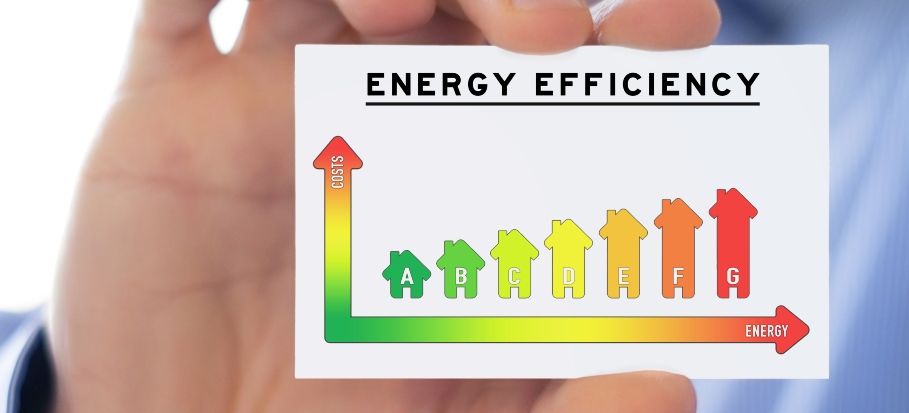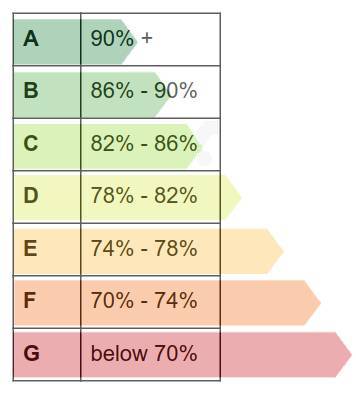What Does ErP Mean on a Boiler? Understanding ErP Ratings, Labels, and Boiler Efficiency

Ever wondered what ErP stands for on a boiler or what an ErP boiler rating really means? An ErP boiler is one that meets the Energy-related Products Directive standards, and ideally comes with an A-rated boiler energy label, meaning it operates at over 90% boiler energy efficiency.
The ErP directive is a crucial piece of legislation affecting all new heating appliances sold in the UK and across the EU. It helps consumers choose more energy-efficient boilers that are cost-effective and eco-conscious. Whether you’re exploring ErP boiler ratings, looking for an energy efficient boiler, or trying to understand the ErP label on a heating system, this guide breaks it all down.
The directive is divided into two key sections: EcoDesign requirements (focused on manufacturing standards) and ErP energy labelling (focused on product efficiency information for buyers). This guide explains the ErP boiler meaning, how ErP ratings affect boiler performance, and why checking your boiler’s energy label matters in 2025.
Table of Contents
What Is an ErP Boiler and Why It Matters
ErP stands for Energy-related Products – a directive introduced by the European Union to improve boiler energy efficiency and reduce greenhouse gas emissions across all 28 member states. Enforced since 2009, it applies to heating appliances like gas boilers, combi boilers, water heaters, and other systems with a heat output of up to 400kW sold on the UK market.
The ErP boiler directive ensures that all modern heating appliances meet minimum performance and environmental standards before they can be sold. The goal? To promote the adoption of ErP-compliant boilers that consume less energy and produce fewer emissions.
Each ErP compliant boiler is rated using the familiar A to G boiler energy label, where A-rated boilers are the most efficient and G-rated the least. This is the same labelling system used on white goods like fridges and washing machines, making it easier for homeowners to compare heating systems at a glance. If you’re unsure how to check the ErP rating on a boiler, consult the appliance’s front panel or the installation manual, which includes all required boiler technical documentation.
In the UK, regulation require that new heating installations meet specific ErP efficiency standards, especially in new builds and renovations. That means when you’re buying or replacing a boiler, understanding what an ErP boiler is and what its label means is essential.
EcoDesign and Energy Labelling Explained
Under the ErP boiler directive, there are two key components that determine a boiler’s compliance: EcoDesign and Energy Labelling. These elements work together to ensure both manufacturers and consumers prioritise energy efficiency and environmental impact when it comes to heating systems.
EcoDesign Requirements
The EcoDesign regulation focuses on how the product is engineered. Specifically, it assesses whether the appliance meets mandatory efficiency and emission standards before being placed on the market. If a product doesn’t meet these standards, it cannot be sold within the EU or UK.
This applies to all heating systems under 400kW, including gas boilers, combi boilers, and water heaters, as well as hot water tanks with a capacity under 2000 litres. In practice, this means manufacturers must design boilers that reduce fuel waste, cut carbon emissions, and improve overall boiler energy efficiency.
Energy Labelling
ErP energy labels help consumers compare products and make informed decisions. These labels use a classification scale from A+++ (most efficient) to G (least efficient), commonly referred to as the ErP rating. However, in 2021, this labelling system was updated for clarity. The previous scale from G to A+++ has been simplified to run from G (least efficient) to A (most efficient), removing the A+, A++, and A+++ categories. This means that appliances which previously carried an A+++ rating may now show an A, even though their energy performance remains the same.
Installers and boiler repair specialists are also legally required to:
- Attach an accurate energy label to the appliance.
- Provide a ‘fiche’ document (a technical sheet outlining efficiency details).
- Ensure the final installed system is labelled appropriately if combining multiple components (e.g., boiler + thermostat).
By standardising efficiency labelling, the ErP directive allows buyers to easily spot ErP compliant boilers and choose eco-friendly heating systems that will lower both their carbon footprint and energy bills.
While ErP is the modern standard, some older appliances may still show SEDBUK ratings. If you’re comparing heating options, it’s helpful to understand the differences between ErP and non-ErP boilers or how ErP vs SEDBUK boiler efficiency ratings stack up.
The Responsibilities of Manufacturers and Installers
Since the ErP directive came into effect in 2015, boiler manufacturers have been legally required to design and supply only ErP compliant boilers that meet strict energy efficiency regulations. Any appliance that fails to meet the minimum standards set by the EcoDesign and Energy Labelling frameworks cannot be sold within the EU or the UK.
This regulation applies to energy-related products for domestic, commercial, and industrial use, covering boilers, water heaters, and heating systems up to 400kW.
Installer Responsibilities Under ErP
Boiler installers and heating engineers also carry specific obligations when fitting or replacing a unit:
- Calculate the final ErP rating when combining components (e.g. boiler + smart thermostat).
- Attach the correct ErP boiler label showing the system’s energy efficiency rating.
- Provide a completed fiche document, which outlines the appliance’s performance specifications.
Installers must also ensure heating system compliance with local regulations and verify that the appliance includes accurate heating appliance labels and a completed fiche.
Why This Matters for Installers and Customers
The introduction of ErP energy labels has made it easier for professionals and customers alike:
- Improved transparency: Installers can clearly explain what each boiler rating means.
- Better guidance: Customers can compare models using ErP ratings, SEDBUK ratings, and other specs.
- More accurate quotes: Installers can base estimates on the efficiency level and installation complexity.
This streamlined approach supports more eco-friendly boiler installations and helps consumers make smarter, cost-saving decisions when choosing new energy efficient heating systems.
Boiler Efficiency Explained
Boiler efficiency measures how effectively a unit converts fuel (gas, oil, or electricity) into usable heat for your home. The less energy wasted during this process, the higher the efficiency, and the better the ErP boiler rating it receives.
As outlined by the ErP directive, boilers are labelled with a rating from A to G, where:
- A-rated boilers are over 90% efficient
- G-rated boilers are typically below 70% efficiency

A newer energy efficient boiler can significantly reduce household emissions and fuel usage. If you’re still running a 15+ year-old model, you might be paying for 40% wasted energy.
How Boiler Efficiency Impacts Your Bills
According to industry estimates, heating systems and boilers account for 50–60% of annual energy bills in the UK. Replacing an outdated boiler with an ErP compliant boiler can save you up to £340 per year, depending on your current system and usage. That’s roughly £25 to £70 per month, depending on your usage and the age of your current boiler system.
- A-rated boilers have an efficiency of 90% or higher and are typically found in newer models aged between 0 and 5 years.
- B to C-rated boilers operate at 85% to 89% efficiency and are generally 6 to 10 years old.
- D to E-rated boilers offer 75% to 84% efficiency, commonly seen in systems that are 11 to 15 years old.
- F to G-rated boilers have an efficiency below 74% and are usually over 15 years old, making them far less energy-efficient.
Modern Boiler Requirements
As of April 2018, UK regulations require that all new boilers are fitted with smart thermostats, load compensators, or weather compensators. These features enhance seasonal boiler efficiency by adjusting heating output based on real-time demand, reducing both fuel consumption and CO2 emissions.
Placement Also Matters
Your boiler’s location also affects its performance. Installing the unit in a well-insulated room, such as a utility cupboard or interior wall, helps reduce heat loss and energy consumption. For gas boiler installations, ensure proper ventilation, some ErP gas boilers emit gases that must be safely vented outside via the flue. Also, since 2018, boiler flue regulations have required that flues be positioned and installed according to UK building codes to minimise exposure to dangerous gases like carbon monoxide. This ensures a safer environment for household occupants and meets compliance requirements.
Pro Tip: Ask your heating engineer to assess your current boiler setup and recommend improvements. Annual boiler servicing can also help maintain efficiency and compliance with ErP regulations. Homeowners can also request a boiler energy report or check for available ErP boiler upgrade services when replacing older units.
How to Choose an Efficient Boiler
Thanks to the 2015 regulations, nearly all new boilers available today are ErP compliant boilers with high-efficiency ratings. This means homeowners can now easily choose an energy-efficient boiler that meets their heating and hot water demands while lowering energy bills and reducing carbon emissions.
When shopping for a replacement, you’ll often see both ErP ratings and SEDBUK scores. While ErP is the current standard for boiler energy labels, some manufacturers still provide SEDBUK ratings alongside ErP scores. SEDBUK, which stands for Seasonal Efficiency of Domestic Boilers in the UK, uses a similar A–G classification and can offer more granular efficiency comparisons, especially for older or legacy systems.
No matter if you’re looking for a gas, combi, electric, or oil-fired boiler, all types are measured by the same energy rating standards. The key is to assess which boiler matches your household needs best.
Here are the two main performance factors to consider:
- Hot Water Efficiency – If you have a busy household with multiple bathrooms or taps in use simultaneously, you’ll need a boiler with strong hot water performance. This ensures reliable boiler pressure and temperature throughout the day.
- Seasonal Heating Efficiency – The location of the boiler, the insulation level of your property, and the temperature controls all influence performance. For optimal results, install the boiler in a warm, insulated space and pair it with smart heating controls or thermostatic radiator valves.
You might also consider a modern condensing boiler with an A-rating under the ErP energy label system, especially if you want to future-proof your heating setup and comply with UK boiler energy laws.
For more help, explore our full boiler replacement guide or contact a certified installer to receive tailored recommendations based on your home’s layout and hot water usage.
Final Takeaways on ErP Boiler Ratings
If you’re in the market for a new boiler, make sure it’s ErP compliant and carries an A-rating for efficiency. These high-performance models are over 90% efficient, helping you cut energy bills and reduce your environmental impact.
While the ErP directive may seem technical at first glance, its purpose is straightforward – to promote eco-friendly boilers and help consumers make smarter, more sustainable choices. Products that meet EcoDesign requirements and display a clear boiler energy label are designed to run efficiently while minimising waste and emissions.
Understanding boiler ratings empowers you to compare models based on real performance, and ensures you stay compliant with UK boiler energy laws. If in doubt, don’t hesitate to seek advice from Gas Safe registered engineers – they’ll help you choose a high-efficiency boiler that fits your home and budget. Choosing an ErP boiler also supports the UK’s wider Net Zero carbon emissions goals, by reducing household energy consumption and promoting sustainable heating solutions.
What Does ErP Mean on a Boiler? Understanding ErP Ratings, Labels, and Boiler Efficiency
Need help? Hire the London Property Service experts today by giving us a call on 020 3078 5920.




